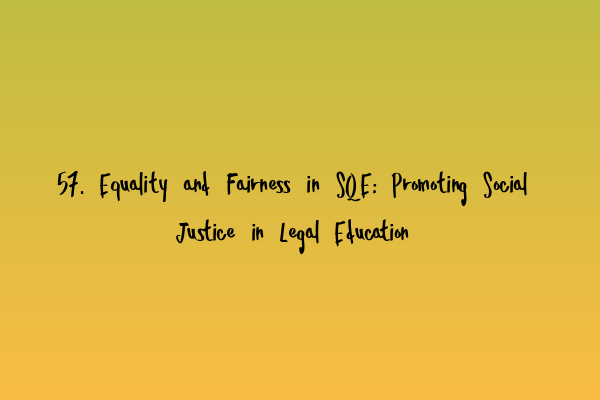57. Equality and Fairness in SQE: Promoting Social Justice in Legal Education
As the legal profession strives to promote equal opportunities and social justice, it is crucial to examine how the Solicitors Qualifying Examination (SQE) can uphold principles of equality and fairness in legal education. In this blog post, we will explore the significance of equality and fairness in the SQE, and discuss the measures that can be taken to ensure a level playing field for all aspiring solicitors.
The Importance of Equality and Fairness in the SQE
Equality and fairness lie at the core of a just legal system. It is essential that legal education, including the SQE, reflects these principles to foster a diverse and inclusive legal profession. By promoting equality and fairness in the SQE, we can ensure that aspiring solicitors from all backgrounds have an equal opportunity to succeed.
Conquer the Multiple Choice Questions (MCQ) in SQE1
Eliminating Bias in the SQE
To achieve equality and fairness in the SQE, it is crucial to eliminate any potential sources of bias in the examination process. This can be done by developing well-structured, standardized exam content that is free from any form of discrimination. Additionally, ensuring diverse representation among the question setters and examiners can help minimize bias and promote fairness.
SQE Sample Papers: Practice for Exam Success
Providing Accessible Study Resources
Equal access to study resources is paramount in creating a level playing field for all SQE candidates. By providing comprehensive and accessible study materials and resources, aspiring solicitors can prepare for the examination on an equal footing. Offering a range of diverse study materials, such as online courses, books, and practice exams, can cater to different learning styles and ensure inclusivity.
Focus Areas in SQE1 and SQE2: Mastering Key Concepts
Supporting Underrepresented Groups
Recognizing the barriers faced by underrepresented groups in the legal profession, it is essential to provide adequate support and resources to help them succeed in the SQE. Targeted outreach programs, mentorship initiatives, and scholarships can be implemented to address the unique challenges faced by these groups and promote diversity within the legal profession.
Adjusting Your SQE Strategy Based on Mock Performance
Transparent and Objective Assessment
To ensure fairness in the SQE, the assessment process should be transparent and objective. Clear assessment criteria and transparent marking schemes can help eliminate any doubts about the fairness of the examination. Moreover, providing candidates with personalized feedback on their performance can support their development and help them understand their areas of improvement.
SQE Mock Debrief Sessions: Critical Steps for Improvement
Promoting Diversity in Legal Education
Promoting diversity in legal education is crucial to building an inclusive legal profession. The SQE should endeavor to attract and support candidates from diverse backgrounds, including individuals from ethnic minorities, LGBTQ+ communities, individuals with disabilities, and individuals from disadvantaged socioeconomic backgrounds. Embracing diversity can enrich legal education and ensure that the legal profession represents society as a whole.
In conclusion, equality and fairness must be central to the SQE to promote social justice in legal education. By eliminating bias, providing accessible study resources, supporting underrepresented groups, ensuring transparent assessments, and promoting diversity, the SQE can play a crucial role in creating a truly inclusive legal profession. Upholding these principles will not only benefit aspiring solicitors but also contribute to the overall fairness and effectiveness of the legal system.
